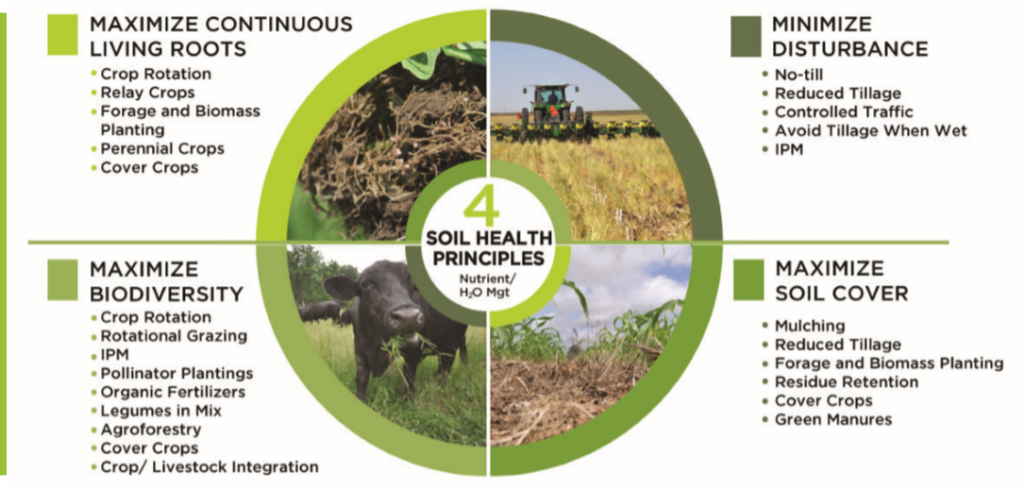Accelerate Adoption of Climate-Smart Agricultural Systems
Quantify. Engage. Inform. Assist.
What is Regenerative Agriculture?
Regenerative agriculture is a holistic, systems approach to farming and the food system that results in improved ecological, social, and economic conditions, including: Producing abundant, healthy food; Enhancing soil health and soil biological life; Supporting functioning ecosystems where wildlife thrives; Supporting thriving rural communities; Creating opportunities for people of all backgrounds, but, particularly black, indigenous, and people of color
Farmers and ranchers manage nearly one billion acres of the land in the United States – working lands that can serve as a natural carbon sink by drawing down atmospheric carbon dioxide and storing it in plants and soils. However, these working lands face threats from land degradation because of historical and common farming practices. Over time, we have lost almost half of the original organic matter in our soils leading to soil erosion, nutrient losses, increased greenhouse gas (GHG) emissions, and reduced yields. For farmers to combat the climate crisis, we must improve the health of our soils.
Rebuilding soil health is the keystone of enhancing agricultural climate resilience and combating climate change. Soil health is defined by the Natural Resources Conservation Service (NRCS) as “the continued capacity of a soil to function as a vital living ecosystem that sustains plants, animals, and humans.” Healthy soils can absorb more water during heavy rains and retain more water during periods of drought. They also improve yields, yield stability, and long-term farm productivity.

Source: Roesch-McNally, G.E., Moore-Kucera, J., Owens, C. (2019)
The adoption of regenerative agricultural practices is a low-cost, ready-to-deploy approach to combat the climate crisis on a meaningful scale. But numerous challenges remain that hinder widespread adoption.
Quantify Impacts
AFT quantifies the impacts of regenerative agriculture practices on soil health metrics, climate benefits, and farm operation economics through on-farm research and modeling. We evaluate and develop new decision-support tools to help guide decision-making from the field-scale to the federal level.
Unite Coalitions & Advance Policy Solutions
Strong state and federal policies are needed to support farmers, ranchers and landowners in adopting regenerative agricultural practices on a much bigger scale. AFT brings together farm and conservation interests to advance policies that enable agriculture to be a central aspect of climate solutions.
Work on the Ground
AFT works directly with farmers, ranchers, and landowners as well as the professionals that support them to increase the adoption of regenerative agriculture practices across America.
Climate Resources
View our reports, factsheets, explainer videos, webinars, and more.
Learn More
